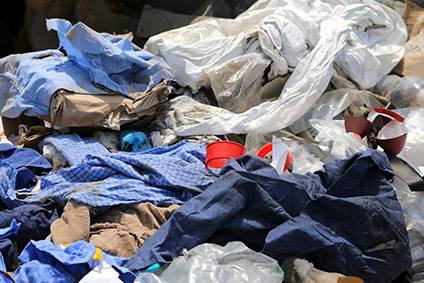
The British public is set to dispose of 67m apparel items as the UK comes out of lockdown, with the majority storing the clothing at home until they can do away with it responsibly, according to a new study which shows a trend towards greater environmental awareness.
The latest public survey by the Waste and Resources Action Programme (WRAP) suggests that two in five UK citizens (41%) have had a clear out of unwanted textiles and clothing during the Covid-19 lockdown, with participants discarding 11 items of clothing, on average.
WRAP’s research, which was undertaken from 22-24 May, also found that two-thirds of participants went out of their way to ensure their unwanted clothes go to good use, holding on the majority of unwanted apparel to donate it once lockdown ends. Almost half (49%) said they would donate the garments through a charity shop or charity bag collection service (17%).
Data reported to WRAP suggested that the equivalent to 184m textile items had been cleared out, with clothes the most popular item to be sorted (37%) and outerwear making up the bulk – particularly T-shirts, blouses, jumpers, hoodies, and sweaters. People have also spent time sorting through their unwanted shoes (19%), bedding (12%), bags and handbags (10%), accessories (10%) and household textiles (10%).
WRAP estimates that as many as 22m pairs of shoes and 67m clothing items will soon be disposed of via charity shops, collection banks, and other donation routes.
Environmental awareness

US Tariffs are shifting - will you react or anticipate?
Don’t let policy changes catch you off guard. Stay proactive with real-time data and expert analysis.
By GlobalDataThe sustainability body’s survey also found that the proportion of people concerned by the environmental impacts of clothing, and actively committed to stopping clothing waste, has risen from 31% of the population in 2017 to 50% by 2020.
What’s more, one in five (20%) UK citizens say the Covid-19 lockdown has made them think differently about clothing – either in terms of purchase and/or disposal.
The top three reflections/changes in mindset were participants realising they had too many clothes, which was cited by 29% of those who said they are thinking differently about clothing; wanting to donate/donate more to charity (18%); and wanting to buy in a more sustainable/environmentally-friendly way (15%).
Groups who are more likely to have reflected upon clothing during the lockdown include women (25% versus 14% of men) and those aged 18-24 (29% versus 17% of those aged 55+).
The sustainability body has published its findings – ‘Citizen Insights: Textiles and Covid-19 Survey’ – in an attempt to help the charitable sector, local authorities and recyclers prepare for the expected influx of textiles likely to be donated over the coming weeks.
“We have been working with organisations from across the sector to prepare for when they reopen and the expected high levels of donations coming in, over a relatively short time period. Everyone can play a role in supporting the charity and textile reuse and recycling sector. Our insights tell us that most people prefer to donate or recycle unwanted clothes, but with an unprecedented volume about to be unleashed it’s important that we all take a few simple steps so not to overwhelm the sector,” says WRAP director Peter Maddox.
“Whether you’re using a charity shop, textile bank, retail take-back scheme or kerbside collections the golden rule is to check they’re operating before you go. Call ahead or look online – check with your local authority – but please never leave clothes in front of a closed charity shop or a full textiles bank.”
As well as sharing with the charitable and recycling section, WRAP is also sharing its findings with signatories to the Sustainable Clothing Action Plan 2020 commitment (SCAP 2020) to help support messaging by retailers and brands encouraging people to donate textiles through in-store collections; which it says are an often-underused route for recycling clothing.
Earlier this month, WRAP said it is making its GBP1.5m (US$1.9m) textiles grant fund more accessible and has streamlined the application process so funds can be allocated more quickly in response to the Covid-19 crisis.
Its latest research was undertaken with 2,422 UK adults aged 18+, from 22-24 May 2020.




